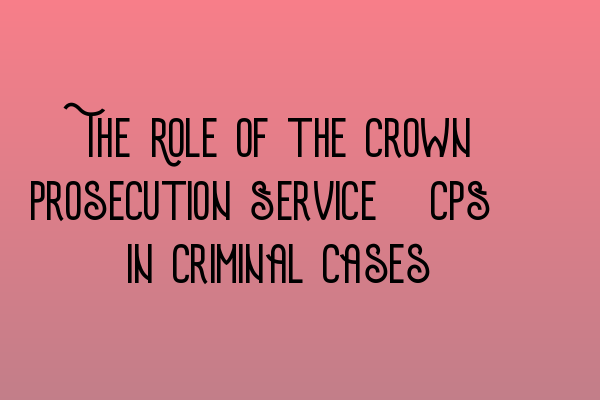The Role of the Crown Prosecution Service (CPS) in Criminal Cases
Welcome to the SQE Criminal Law & Practice Law UK blog! In today’s post, we will discuss the crucial role of the Crown Prosecution Service (CPS) in criminal cases. The CPS plays a vital part in the criminal justice system in the United Kingdom, ensuring a fair and effective prosecution process.
The Crown Prosecution Service: An Overview
The Crown Prosecution Service (CPS) is an independent public authority responsible for prosecuting criminal cases in England and Wales. Its primary function is to review and evaluate evidence gathered by the police and other law enforcement agencies and determine whether there is sufficient evidence to proceed with a criminal prosecution. The CPS aims to ensure that justice is served and that guilty individuals are held accountable for their actions.
The CPS works closely with the police and other investigative agencies throughout the criminal justice process. They provide advice and guidance on the strength of the evidence, potential charges, and the overall viability of a prosecution. This collaboration ensures that all cases are thoroughly examined before moving forward.
It’s important to note that the CPS operates independently from the police and acts impartially in its decision-making process. Their primary duty is to assess the evidence objectively and make fair decisions based on the public interest and the principles of justice.
The Role of the CPS in Criminal Cases
The CPS fulfills a range of responsibilities during criminal proceedings. Here are some of the key roles performed by the CPS:
1. Case Assessment: The CPS assesses the evidence provided by the police and determines whether it is sufficient to proceed with a prosecution. They consider factors such as the credibility and reliability of witnesses, the admissibility of evidence, and the likelihood of a successful outcome at trial.
2. Charging Decision: If the CPS determines that there is enough evidence to support a prosecution, they decide on the appropriate charges to bring against the accused. This decision is made taking into account the seriousness of the offense and the available evidence.
3. Preparation of the Case: The CPS prepares the case for trial by gathering additional evidence, arranging witness statements, and liaising with the defense to exchange relevant information.
4. Legal Advice: The CPS provides legal advice to the police and other agencies throughout the investigation process. They guide investigators on collecting admissible evidence and advise on any legal issues that may arise.
5. Court Representation: The CPS represents the prosecution in court proceedings. They present the evidence, examine witnesses, and argue the case on behalf of the victim and the public interest.
6. Victim Support: The CPS is responsible for providing support and information to victims and witnesses involved in criminal cases. They ensure that victims’ rights are upheld and that they are given the necessary assistance throughout the process.
It is crucial to understand that the CPS operates under a set of guidelines and principles outlined in the Code for Crown Prosecutors. These guidelines emphasize fairness, impartiality, and the public interest, ensuring consistent decision-making across all cases.
Conclusion
The Crown Prosecution Service (CPS) plays a fundamental role in the criminal justice system of England and Wales. Their diligent work in assessing evidence, making charging decisions, and preparing cases for trial ensures that justice is served and that the public interest is protected. The CPS’s independence and commitment to fairness make it a vital component of the criminal justice process.
If you would like to further enhance your knowledge and expertise in criminal practice, we recommend checking out these related articles:
- Workshops and Seminars on Criminal Practice: Expanding Your Expertise
- Updates in UK Criminal Laws: Staying Informed and Prepared
- Enhancing Your SQE Criminal Law Study Group Experience
- Decoding Criminal Evidence Rules: A Detailed Analysis
- Deep Dive into Fraud and Financial Crimes in the UK
Stay tuned for more informative articles on criminal law and practice, and be sure to explore our website for workshops, seminars, and study group resources to expand your expertise in this field.
